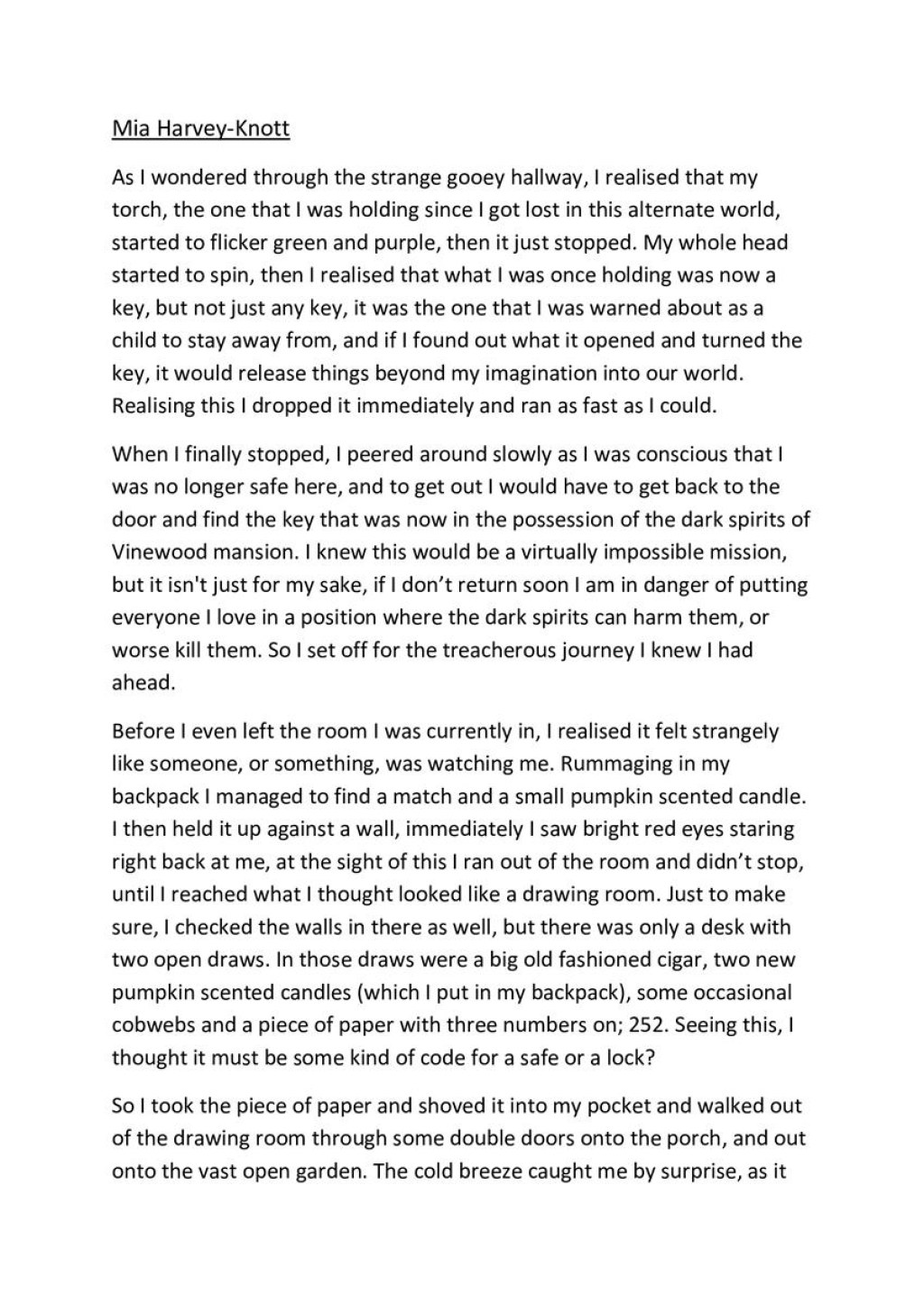Unleashing Imagination: Explore Captivating Creative Writing Year 7 Examples And Ignite Your Writing Journey Now!
Creative Writing Year 7 Examples: Unleashing the Imagination
Introduction
Dear Readers,
2 Picture Gallery: Unleashing Imagination: Explore Captivating Creative Writing Year 7 Examples And Ignite Your Writing Journey Now!


Welcome to an exciting journey into the world of creative writing! In this article, we will explore the fascinating realm of creative writing year 7 examples. As young writers embark on their creative endeavors, they are introduced to various techniques and tools that enable them to express their thoughts, emotions, and ideas in a captivating manner.

Image Source: pinimg.com
In this article, we will delve into the what, who, when, where, why, and how of creative writing year 7 examples. You will discover the advantages and disadvantages of engaging in this art form, as well as find answers to frequently asked questions. By the end, we hope to provide you with a comprehensive understanding of creative writing year 7 examples and inspire you to embark on your own creative writing journey.
So, without further ado, let’s dive into the enchanting world of creative writing!
What is Creative Writing?
🖋️ Unleashing the Imagination: The Power of Creative Writing

Image Source: herts.sch.uk
Creative writing is the art of expressing oneself through written words. It is a form of self-expression that allows individuals to explore their imagination, thoughts, and emotions. Whether it’s a short story, a poem, or a play, creative writing year 7 examples provide young writers with the opportunity to develop their unique voice and style.
By engaging in creative writing, students learn to think critically, communicate effectively, and develop their storytelling skills. They have the freedom to experiment with different genres, writing techniques, and perspectives, helping them to discover their passions and strengths as writers.
Through the creative writing process, students not only enhance their writing abilities but also develop important life skills such as creativity, empathy, and problem-solving. It is a journey of self-discovery that fosters personal growth and cultivates a love for the written word.
Who Can Engage in Creative Writing?
👩🎨 Unlocking the Writer Within: Creative Writing for All
Creative writing is not limited to a select few; it is a form of expression that is accessible to everyone. Whether you are a budding writer, an aspiring poet, or simply someone who loves to write, creative writing year 7 examples offer a platform for all individuals to explore their creativity and share their stories.
Year 7 students, in particular, are at an age where their imagination is boundless. Engaging in creative writing at this stage helps them nurture their creative spark and harness their writing skills. It provides an outlet for them to express their thoughts and emotions, fostering a sense of self-confidence and empowerment.
Teachers, parents, and mentors play a vital role in guiding and encouraging students in their creative writing journey. By providing constructive feedback, offering inspiration, and creating a supportive environment, they can help young writers unlock their full potential.
When and Where Can Creative Writing Take Place?
🗓️ The Time and Space for Creativity: Creative Writing Year 7 Examples
Creative writing can take place anytime and anywhere. Whether it’s in the classroom, during leisure time, or even in the midst of nature, the possibilities are limitless. Year 7 students can engage in creative writing exercises as part of their English curriculum, as extracurricular activities, or even as individual projects.
By providing students with a conducive environment, such as a quiet writing corner or a dedicated writing workshop, educators can inspire and encourage them to embark on their creative writing journey. Additionally, the use of technology, such as online writing platforms or writing apps, can enhance the writing experience and provide students with a broader audience for their work.
It is important to create a space and time for creative writing, allowing students to immerse themselves in their imagination and let their ideas flow freely. By doing so, students can fully explore their creativity and produce their best work.
Why Is Creative Writing Important?
❓ Nurturing the Creative Mind: The Importance of Creative Writing
Creative writing is not just about penning stories; it is an essential tool for personal and academic growth. It encourages critical thinking, enhances communication skills, and fosters empathy and understanding. Here are a few reasons why creative writing is important:
Self-expression: Creative writing allows individuals to express their thoughts, emotions, and ideas in a unique and authentic way.
Imagination and creativity: It nurtures the imagination, enabling individuals to think outside the box and explore new possibilities.
Language development: Engaging in creative writing improves vocabulary, grammar, and overall language skills.
Emotional well-being: Writing can be a therapeutic process, helping individuals process their emotions and find solace in their thoughts.
Empathy and understanding: Through storytelling, creative writing promotes empathy and understanding of diverse perspectives.
Academic success: Effective writing skills are essential for academic success across various subjects.
By recognizing the importance of creative writing, educators can empower students to embrace their creativity, enhance their academic abilities, and develop as well-rounded individuals.
How Can I Start Engaging in Creative Writing?
🌟 Unleash Your Inner Writer: Getting Started with Creative Writing
Embarking on your creative writing journey can be both exciting and daunting. Here are a few steps to help you get started:
Read extensively: Explore various genres, authors, and writing styles to broaden your knowledge and gain inspiration.
Write regularly: Make writing a habit by setting aside dedicated time every day or week to practice your craft.
Experiment with different styles: Try your hand at different writing styles, such as poetry, short stories, or even plays.
Join writing groups or workshops: Connect with fellow writers, share your work, and receive constructive feedback.
Embrace feedback: Be open to feedback from teachers, peers, or mentors, as it can help you improve and grow as a writer.
Be persistent: Writing is a journey of continuous learning and improvement. Stay committed to honing your craft and never give up.
Remember, creative writing is a personal and unique experience. Embrace your individuality, let your imagination soar, and enjoy the process of self-discovery through words.
Advantages and Disadvantages of Creative Writing Year 7 Examples
✅🚫 Exploring the Pros and Cons: Is Creative Writing Right for You?
Creative writing year 7 examples offer numerous advantages and some potential disadvantages. Let’s explore both sides:
Advantages of Creative Writing Year 7 Examples
Enhanced creativity: Creative writing nurtures imagination and encourages individuals to think outside the box.
Improved communication skills: Writing effectively requires clarity, organization, and the ability to convey ideas coherently.
Personal growth: Engaging in creative writing allows individuals to explore their thoughts, emotions, and identity.
Empathy and understanding: Through storytelling, writers can develop a deeper understanding of others’ perspectives.
Critical thinking: Creative writing challenges individuals to analyze, interpret, and evaluate their ideas and the world around them.
Disadvantages of Creative Writing Year 7 Examples
Time-consuming: Writing creatively requires time and dedication, which can be challenging for individuals with busy schedules.
Subjectivity: Evaluating creative work is subjective, and feedback may vary, making it difficult to determine the quality of one’s writing.
Writer’s block: Creative writing can be accompanied by periods of writer’s block, where inspiration seems to elude even the best writers.
Self-doubt: Writers may experience self-doubt and fear of judgment, hindering their creative process.
Rejection: Submitting work for publication or sharing it with others can result in rejection, which can be disheartening.
While creative writing year 7 examples offer numerous benefits, it is essential to be aware of the potential challenges and be prepared to overcome them. With determination and perseverance, the rewards of creative writing far outweigh the drawbacks.
Frequently Asked Questions (FAQ)
🔍 Unlocking the Mysteries: Answers to Your Creative Writing Questions
1. Can anyone become a good creative writer?
Yes, anyone can become a good creative writer with practice, dedication, and a willingness to learn. Remember, creativity is subjective, and the most important aspect of creative writing is expressing yourself authentically.
2. How can I overcome writer’s block?
Writer’s block is a common challenge faced by writers. To overcome it, try freewriting, changing your writing environment, or seeking inspiration from books, music, or nature. Remember, writer’s block is temporary, and perseverance is key.
3. How can I improve my storytelling skills?
Improving storytelling skills involves studying various narrative techniques, practicing storytelling exercises, and reading works of accomplished authors. Additionally, seeking feedback from peers and mentors can help you enhance your storytelling abilities.
4. Is it necessary to share my work with others?
Sharing your work with others can provide valuable feedback and perspectives. However, it is entirely up to you whether you choose to share your work. Remember, creative writing is a personal journey, and your comfort and preferences should guide your decisions.
5. Can creative writing help me in other aspects of life?
Absolutely! Creative writing enhances critical thinking, communication skills, empathy, and self-expression. These skills are applicable in various aspects of life, such as academics, personal relationships, and professional pursuits.
Conclusion: Unleash Your Creativity
Dear Readers,
As we conclude our exploration of creative writing year 7 examples, we hope you have gained valuable insights into the power and potential of this art form. Creative writing is not just a means of expression; it is a journey of self-discovery, personal growth, and empowerment.
Whether you are a year 7 student venturing into the world of creative writing or someone seeking to reignite their passion for storytelling, we encourage you to embrace your imagination, experiment with different writing styles, and let your words transport readers to new worlds.
Remember, the world needs your unique voice and stories. So, pick up your pen or open a blank document, and embark on your own creative writing journey. Unleash your creativity and watch as your words come to life.
Final Remarks: Disclaimer
📜 Your Journey, Your Words: A Final Note of Encouragement
Dear Friends,
The information provided in this article is intended to serve as a general guide to creative writing year 7 examples. While every effort has been made to ensure the accuracy and completeness of the information, it is important to note that individual experiences may vary. The creative writing journey is unique to each writer, and what works for one may not work for another.
Additionally, it is crucial to respect copyright laws and intellectual property rights when engaging in creative writing. Plagiarism is a serious offense and can have legal consequences. Ensure that any work you share or publish is your original creation or properly attributed to the respective authors.
Finally, remember that writing is a continuous learning process. Embrace feedback, seek inspiration from various sources, and never stop honing your craft. Your words have the power to inspire, evoke emotions, and make a difference.
Happy writing!
This post topic: Creative Writing

